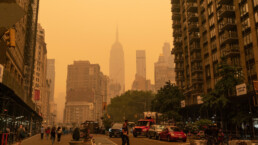As skies turn orange, the media still hesitate to mention what’s changing the climate.
by Olivia Riggio, FAIR
Skies on the US’s East Coast turned an apocalyptic orange in early June, as wildfire smoke from Canada blew south. On Wednesday, June 7, New York City’s air quality ranked the worst in the world, with an Air Quality Index rating of more than 400 out of 500—deemed “hazardous” for any individual.
Scientists expect forest fires to increase with the advance of climate disruption—mainly driven by fossil fuel consumption. Hotter, dryer weather, an increase in the type of brush that fuels these fires, and more frequent lightning strikes all contribute to this outcome (NOAA, 8/8/22; UN, 2/23/22; PNAS, 11/1/21; International Journal of Wildland Fire, 8/10/09).

Short-term exposure to fine particulate matter in wildfire smoke can cause nose, throat and lung irritation, as well as worsening underlying conditions like asthma and heart disease. Over months or years, this exposure can increase chances of chronic bronchitis, as well as hospital admissions and deaths due to conditions like lung cancer and heart disease. In Delhi, India, which typically has the worst air quality in the world, pollution takes an average of nine years off residents’ life expectancy (Democracy Now!, 6/8/23).
Recent Posts
“Arrest Now, Ask Questions Later”: Why Did L.A. ICE Agents Arrest and Jail U.S. Citizen Andrea Velez?
July 3, 2025
Take Action Now “They didn’t have vests that said ICE or anything. Their cars didn’t have license plates. … Just because of the color of our…
Trump’s Big, Beautiful Bill Is Naked Class War
July 3, 2025
Take Action Now Trump’s “Big, Beautiful Bill” trades tax cuts on millionaires for the dissolution of society.By Hamilton Nolan, In These Times…
Mayor Mamdani’s First Day, A Zero Hour Conversation With Richard Wolff
July 2, 2025
Take Action Now If elected, what would Mayor Mamdani do on his first day in City Hall? How would a democratic socialist govern as a big-city mayor?……
The U.S. Is Funding A Bloodbath At Gaza Aid Centers
July 2, 2025
Take Action Now The admin just gave $30M to GHF, the organization at the center of charges that Israel is weaponizing assistance and shooting at…




